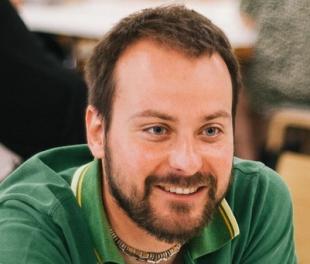Post date:
Enrico Mastropaolo was an internationally recognised expert in the development of microfabrication technology and its application to microelectromechanical systems (MEMS).
Born in 1981, Enrico received his Laurea degree in Microelectronics Engineering from the Universita' degli Studi di Padova, Padova, Italy, in 2006. Afterwards, he obtained his PhD degree in microsystems and microfabrication in 2011, from the School of Engineering at the University of Edinburgh.
Enrico was an active member of the Research Institute for Integrated Micro and Nano Systems (IMNS). He then continued his research activity as a Research Associate within the Institute, working on silicon carbide resonators for timing applications, before his lectureship appointment to the Mechanical Engineering Discipline in 2013. Enrico was promoted to Senior Lecturer earlier this year.
Enrico’s initial research focus was on microelectromechanical systems (MEMS) including their design, simulation, fabrication, and characterisation, with a special interest in electrothermal and piezoelectric transduction techniques, as well as the dynamics of microstructures. Latterly, he collaborated with biologists, mechanical and chemical engineers to work on polymer-based structures and the interaction of micro and small-scale structures with fluid flows.
Enrico’s research was truly interdisciplinary and spanned biology, electronics, mechanical and chemical engineering - with profound impact. Possibly one of the most significant contribution of Enrico to engineering was the Nature paper: 'A separated vortex ring underlies the flight of the dandelion' (Nature 2018;562:414-418). Here, Enrico played a key role in the development of new fabrication techniques that allowed the first-ever replica of a dandelion to be built and tested in a wind tunnel, and hence a new way of flight to be revealed.
Trained as an electronics engineer, Enrico’s teaching affiliation was with Mechanical Engineering. Enrico’s breadth and depth of fundamental knowledge allowed him to re-invent himself as a mechanical engineer with great skill and determination. Within Mechanical Engineering, he lectured students for several years in dynamics, as well as supervising many final-year projects. Enrico contributed fully to the management of the Mechanical Engineering Discipline, by participating in the Discipline Committee and several subcommittees, including the Academic and Resource Allocation Committees.
Enrico had an inquiring mind, was a very easy-going individual and was able to collaborate with scientists with different backgrounds. Staff and students alike appreciated greatly his kindness, generosity, and the time and commitment that he put into communicating with them and supporting them.
Some of his interdisciplinary and innovative research proposals and projects are only just blossoming. It is difficult to express in words the feeling of the tragic loss of a great scientist, a generous colleague and a wonderful human being so young and vital, along with the acceptance that the real potential and impact of his work was yet to be realised – a great loss to the University and science as a whole.
Enrico is survived by his wife Annalisa, not-yet-born Tobia, and his parents.
Words by Professor Hugh McCann, Professor Rebecca Cheung & Professor Conchúr Ó Brádaigh



